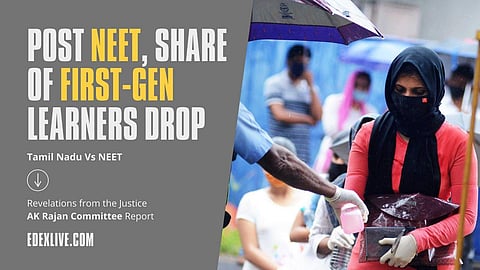

Have the first generation learners in Tamil Nadu been finding it easy to get an MBBS seat since the inception of NEET? The statistics do not suggest it. According to the data compiled by the High-Level Committee To Study The Impact of NEET on Medical Admissions in Tamil Nadu, between 2016-17 and 2020-21, the percentage share of first generation learners who secured medical admissions has come down by approximately 15 per cent.
The report stated, "Overall, percentage share of the FGG (First Generation Graduate) has reduced from 24.94 per cent in 2016-17 to 14.46 per cent in 2020-21 in the Government lot, while that of the Non-FGG rose to 85.54 per cent in 2020-21 from 75.06 per cent," reads the report. It also notes that "If the rate of applications is considered, the FGG‟s application was reduced in the post-NEET era as opposed to an increased rate of applications by the Non-FGG."
Similarly, the seat share of students from rural parts of the state too has come down, post NEET. The reports say that "while the rural students maintained an average of 61.45 per cent in the pre-NEET era and fell down to 49.91 per cent in 2020-21 in post-NEET times, the urban students who had a 38.55 per cent average pre-NEET rose to 50.09 per cent in 2020-21 in post-NEET times. It adds, "Compared to the pre-NEET period, the rural segment has lost its share of admission in the post-NEET that it once maximally enjoyed pre-NEET."
The committee that vehemently opposed the conduct of NEET also listed reasons why the examination will be disadvantageous for students living in rural parts of the state. "NEET is against social justice, humanism and equality. NEET exam prevents the opportunity for tribal, rural and oppressed students to pursue medical education. Especially, it has helped the private and deemed universities to prevent the oppressed students to pursue medicine in their institutions," it says, adding, "Answering 180 questions in 3 hours would be possible only with proper training, 3 minutes per question is something that can only be accomplished by those who are well trained. The rural poor students who are not trained to face such exams cannot do it properly."
READ ALSO: TN Vs NEET: Repeaters, drop year students armed with private coaching get 72% MBBS seats, courtesy NEET
The report by the Tamil Nadu government's high-level committee headed by retired Judge AK Rajan on the impact of NEET in medical admissions in Tamil Nadu was made public on September 20. The 165-page report, which was submitted on July 14 criticises NEET and seeks its immediate ban in Tamil Nadu.
At the same time, Dr G R Ravindranath, General Secretary, Doctors' Association for Social Equality and a member of the committee said that NEET is totally against the students from Tamil Nadu and that the centre should work along with the state to ban it completely. "The centre has to agree to this demand and must amend its NMC bill to facilitate the ban of NEET in Tamil Nadu. Additionally, there must be a provision for states that are against the examination to raise their voice," he said.
